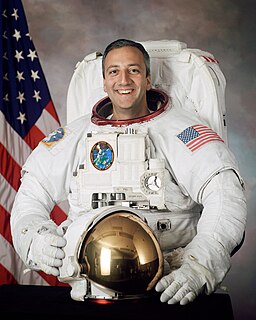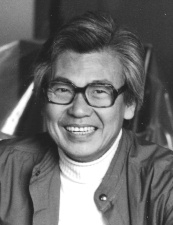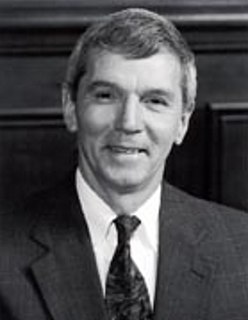Related Research Articles

The Deutsches Museum in Munich, Germany, is the world's largest museum of science and technology, with about 28,000 exhibited objects from 50 fields of science and technology. It receives about 1.5 million visitors per year.

The Technical University of Munich is a public research university in Munich, with additional campuses in Garching, Freising, Heilbronn, Straubing, and Singapore. A technical university that specializes in engineering, technology, medicine, and the applied and natural sciences, it is organized into 11 schools and departments, and supported by numerous research centers.

Michael James Massimino is an American professor of mechanical engineering at Columbia University and a former NASA astronaut. He is the senior advisor of space programs at the Intrepid Sea, Air & Space Museum.
Chinesisch-Deutsches Hochschulkolleg, or CDHK, is the Chinese German College for Postgraduate Studies located in Shanghai, China.

Friedrich Ludwig "Fritz" Bauer was a German pioneer of computer science and professor at the Technical University of Munich.
The Gottfried Wilhelm Leibniz Prize, in short Leibniz Prize, is awarded by the German Research Foundation to "exceptional scientists and academics for their outstanding achievements in the field of research". Since 1986, up to ten prizes are awarded annually to individuals or research groups working at a research institution in Germany or at a German research institution abroad. It is considered the most important research award in Germany.

Hendrik Wade Bode was an American engineer, researcher, inventor, author and scientist, of Dutch ancestry. As a pioneer of modern control theory and electronic telecommunications he revolutionized both the content and methodology of his chosen fields of research. His synergy with Claude Shannon, the father of information theory, laid the foundations for the technological convergence of the information age.
Eugene Shallcross Ferguson was an American engineer, historian of technology and professor of history at the University of Delaware, particularly known for his 1992 work Engineering and the Mind's Eye.
Douglas Taylor "Doug" Ross was an American computer scientist pioneer, and chairman of SofTech, Inc. He is most famous for originating the term CAD for computer-aided design, and is considered to be the father of Automatically Programmed Tools (APT), a programming language to drive numerical control in manufacturing. His later work focused on a pseudophilosophy he developed and named Plex.

Winfried Otto Schumann was a German physicist who predicted the Schumann resonances, a series of low-frequency resonances caused by lightning discharges in the atmosphere.

Wen-Ying Tsai was a Chinese-American pioneer cybernetic sculptor and kinetic artist best known for creating sculptures using electric motors, stainless steel rods, stroboscopic light, and audio feedback control. As one of the first Chinese-born artists to achieve international recognition in the 1960s, Tsai was an inspiration to generations of Chinese artists around the world.
Werner Gruner (1904–1995) was a small-arms designer, mechanical engineer, university teacher and from 1958 to 1961 rector of the Dresden University of Technology.

Rolf Frick was a German university professor and politician.
Ernst Wilhelm Mayr is a German computer scientist and mathematician. He received the Gottfried Wilhelm Leibniz Prize in 1997 awarded for his contributions to theoretical computer science.
Otto Metzger was a German-British engineer, and inventor of an impact-extrusion process for forming seamless zinc and brass cans.

Charles Talbot Porter was an American lawyer, engineer, and inventor of mechanical devices, particularly the high-speed steam engine. He was recipient of the 1909 John Fritz Medal.

Leroy Stevenson (Skipp) Fletcher is an American mechanical and aerospace engineer, and college dean, who served as the 104th president of the American Society of Mechanical Engineers in 1985–86, and was recipient of the 2002 ASME Medal.
Wilfried de Beauclair was a Swiss-born German engineer and computer scientist. His work on automated computing technology makes him one of the first-generation computer pioneers.

The TUM Department of Mechanical Engineering is a department of the Technical University of Munich, located at its Garching campus.